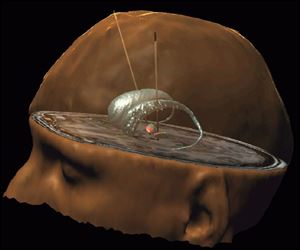
Brain 'pacemaker' may hold promise
11/14/2008
An illustration from doctors in France depicts two electrodes inserted into a part of the brain that deals with motion, thinking, and emotion. In a study of 16 patients with obsessive-compulsive disorder, symptoms nearly disappeared for four of them. Serious side effects were reported in several of the patients.
NEW YORK - The same kind of deep-brain stimulation used to treat some patients for Parkinson's disease also helped a few people with obsessive-compulsive disorder, French scientists reported.
The study involved only 16 patients, but in four of them, symptoms nearly disappeared. But many patients had serious side effects, including one case of bleeding in the brain.
The treatment involved an experimental brain pacemaker, and it reduced repetitive thoughts and behaviors in some of the patients - just as it blocks tremors for some Parkinson's sufferers.
The researchers came up with the approach after noticing that two Parkinson's patients who got the treatment also showed improvement with their obsessive-compulsive disorders. Other small studies have targeted a different part of the brain for that disorder and depression.
In the French study, symptoms were reduced more than 25 percent, researchers said.
The results are "very encouraging," said the study's lead author, Dr. Luc Mallet of Pitie-Salpetriere Hospital in Paris. In an e-mail, he said the procedure should be used only in medical studies because of the possible side effects.
The findings were reported in yesterday's New England Journal of Medicine.
About 2.2 million U.S. adults have obsessive-compulsive disorder. It involves recurring, unwanted thoughts, such as a fear of germs, and people who have it engage in rituals such as repeatedly washing their hands or checking on something again and again.
Standard treatment - antidepressants and psychotherapy - doesn't work in everyone. The patients in the French study were severe cases who didn't respond to treatment.
All had surgery to have the pacemaker - similar to a heart pacemaker - implanted in their chest and connected to electrodes inserted into their brains. Each patient had the pacemaker turned on for three months and turned off for three months. Neither the patients nor doctors knew when the device was on or off.
The researchers used different tests to measure changes in symptoms. In one evaluation, after three months of stimulation, the severity of symptoms overall had dipped to 19 on a 40-point scale, compared to a score of 28 after three months of no treatment.
Eleven patients had serious side effects; one had bleeding in the brain. For some patients, the stimulation resulted in a mild form of mania and other problems that went away when adjustments were made.
Dr. Mallet said the area of the brain they targeted - the subthalamic nucleus - deals with motion, thinking, and emotion. Previous studies for obsessive-compulsive disorder focused on regions involving mood and anxiety.